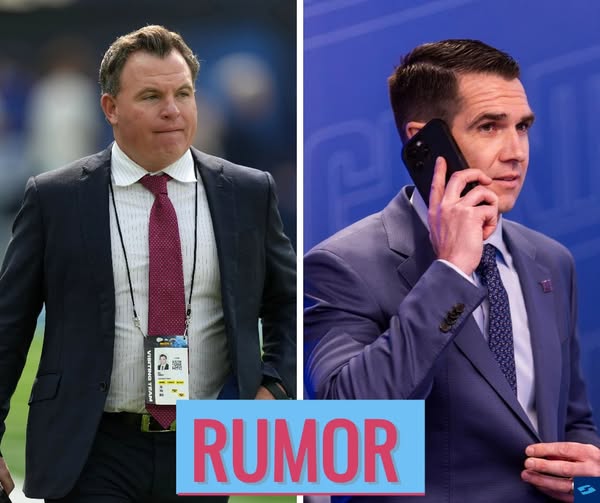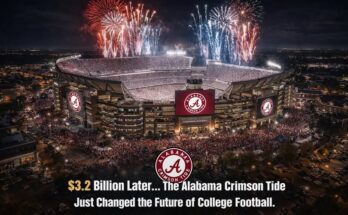Rumor has it that there’s some backstage drama brewing within the NFL regarding the Tennessee Titans and their handling of the first overall pick in the recent draft. According to whispers circulating among league insiders, some NFL executives were reportedly frustrated that the Titans declined to trade away that coveted top spot to the New York Giants. The gist of the chatter is that the league was hoping the Giants would land the quarterback chosen first overall—Cam Ward—so that the spotlight would shine brighter on a bigger market, ostensibly driving more national interest, ratings, and revenue. This speculation, which remains unconfirmed and veiled in rumor, has added a layer of intrigue and controversy to the Titans’ offseason moves, or rather, their decision not to make a trade.
To break down the heart of this rumor, it’s important to understand the stakes involved with the first overall pick in the NFL Draft. This pick is not just a piece of a team’s future; it’s often seen as a franchise-defining asset. For a team like the Titans, who have been on the cusp of greater success but haven’t quite broken through to the elite level, the decision to hold onto that pick and select Cam Ward carries massive weight. Ward, a highly touted quarterback prospect, is viewed as the potential future face of the franchise. By keeping him, the Titans made a clear statement that they are committed to building around their new quarterback and charting their own course forward. This is a significant commitment to a player and a signal of confidence in their own team and market.
Now, the rumor suggests that some NFL executives were peeved because the league apparently would have preferred to see Ward don a Giants uniform. The Giants, as one of the league’s most historic and popular franchises, are based in New York, one of the largest media markets in the world. Having a promising quarterback like Ward in that market would almost certainly boost television ratings, media coverage, and overall hype. Big markets mean big business. The league’s preference for placing a potential star quarterback in New York rather than Tennessee is thus understandable from a commercial standpoint, but it raises thorny questions about fairness and competitive integrity. Should a league subtly steer outcomes to favor certain markets over others? This is where the rumor becomes problematic.
Adding fuel to this speculation is the observation that the Titans were not scheduled for any primetime games during the upcoming fall season, despite selecting a player of Ward’s caliber with the first overall pick. Primetime games, especially those on Sunday nights or Monday nights, are highly coveted spots that give teams national exposure and help grow their fanbase. They also tend to come with significant revenue benefits for the franchise. For a team in Tennessee, which is considered a smaller market relative to New York, missing out on these games can be seen as a slight or a sign that the league isn’t giving them equal spotlight.
From the viewpoint of the Titans’ fans and local media, this could be interpreted as an unfair consequence, especially if the rumor holds any grain of truth. It might feel as though the league is penalizing the team for refusing to make a trade that would have benefited another franchise—and a bigger market one at that. This kind of behind-the-scenes maneuvering, if it exists, would certainly spark debate about how the league balances its business interests with the principles of fairness and equal opportunity for all franchises.
On the other hand, it’s important to remember that rumors in professional sports often swirl with a mix of fact, speculation, and outright exaggeration. The NFL, like many professional leagues, does have its own interests and priorities, which sometimes lead to perceptions of favoritism or preferential treatment. However, there is no public confirmation or official statement from the NFL or its executives supporting this rumor. The league and the teams involved typically maintain tight control over such discussions, and many decisions, including scheduling of primetime games, are influenced by a multitude of factors such as team performance, market size, rivalry appeal, and broadcast partner preferences.
The Titans’ decision to keep the first overall pick and draft Cam Ward likely involved extensive internal deliberation weighing the potential risks and rewards. The value of a franchise quarterback can’t be overstated. Ward’s development and success could transform the Titans into perennial contenders, boost local fan engagement, and elevate the franchise’s profile nationally. By choosing to build around him rather than cashing in on the pick via a trade, the Titans demonstrated a long-term vision that prioritizes stability and growth over short-term financial gain or appeasing the league’s commercial interests.
From a broader perspective, this situation highlights the complex intersection between sport as competition and sport as business. The NFL is one of the most profitable sports leagues globally, and its operations are heavily influenced by television contracts, sponsorship deals, and market considerations. It’s no secret that large markets like New York, Los Angeles, and Chicago draw more eyeballs and generate higher advertising revenues. Naturally, the league wants to maximize exposure for its stars and marquee games. This can sometimes lead to tension with smaller-market teams who feel overlooked or undervalued in the grand scheme of league priorities.
The rumor about the Titans not getting primetime games as a sort of “punishment” or consequence for not trading to the Giants underscores this tension. While it makes for a compelling narrative, it’s essential to approach such stories critically and recognize that scheduling decisions can be influenced by many legitimate factors beyond market size or draft pick politics. The NFL also wants competitive, entertaining matchups in primetime slots, which means teams with exciting players or recent success often get priority. If the Titans had struggled in recent seasons or lacked a strong national following, that could explain their absence from primetime schedules without resorting to conspiracy theories.
Furthermore, the role of rumors and leaks in the sports world cannot be overlooked. They often serve as tools for shaping narratives, pressuring teams or executives, or simply fueling fan engagement. Sometimes insiders leak information to influence public opinion or negotiations, while other times rumors arise from misinterpretations or wishful thinking. In this case, the rumor about the Titans and Giants trade drama may reflect broader frustrations or competitive rivalries within the league rather than an orchestrated league policy.
At the end of the day, the focus should remain on the field and the players. Cam Ward’s development as a rookie quarterback will be closely watched, regardless of the market or media spotlight. The Titans’ management will be judged by their ability to build a winning team around him. If Ward excels and the Titans succeed, it will speak volumes about the team’s front office decisions and their faith in their chosen quarterback. Market size or league preferences will matter far less than tangible results on the gridiron.
In conclusion, the rumor about the NFL executives’ frustration over the Titans not trading the first overall pick to the Giants and the subsequent lack of primetime games raises interesting questions about the intersection of sports, business, and fairness. While it’s easy to understand why the league might prefer a big-market team like New York to have a highly touted quarterback, any suggestion that the league punishes a team for not facilitating such a move is troubling if true. However, without official confirmation, this remains speculation. The Titans’ decision to keep Cam Ward reflects their confidence in his potential and their commitment to building a competitive team in Tennessee. Ultimately, the success of this decision will be judged by Ward’s performance and the Titans’ results on the field rather than the whispers that swirl off the field.



